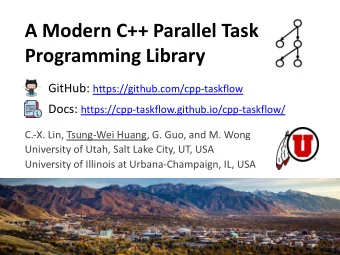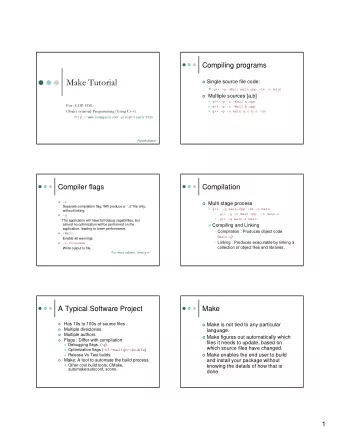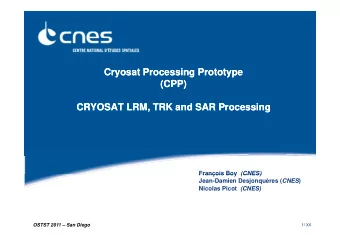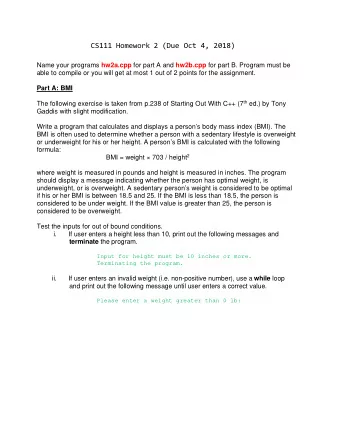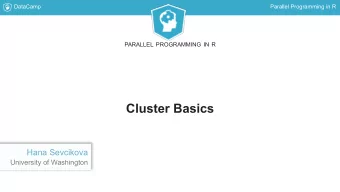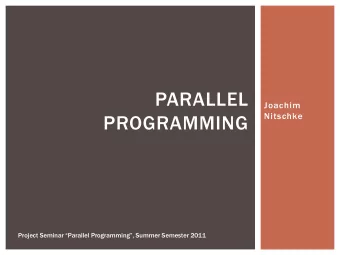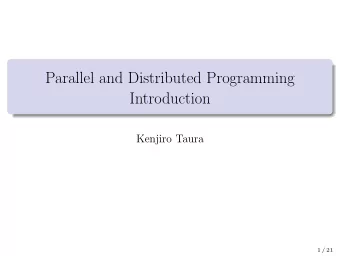
Cpp-Taskflow: Fast Task-based Parallel Programming using Modern C++ - PowerPoint PPT Presentation
Cpp-Taskflow: Fast Task-based Parallel Programming using Modern C++ Tsung-Wei Huang, C.-X. Lin, G. Guo, and M. Wong Department of Electrical and Computer Engineering University of Illinois at Urbana-Champaign, IL, USA 1 Cpp-Taskflows
Cpp-Taskflow: Fast Task-based Parallel Programming using Modern C++ Tsung-Wei Huang, C.-X. Lin, G. Guo, and M. Wong Department of Electrical and Computer Engineering University of Illinois at Urbana-Champaign, IL, USA 1
Cpp-Taskflow’s Project Mantra A programming library helps developers quickly write efficient parallel programs on a shared-memory architecture using task-based approaches in modern C++ q Task-based approach scales best with multicore arch q We should write tasks instead of threads q Not trivial due to dependencies (race, lock, bugs, etc) q We want developers to write parallel code that is: q Simple, expressive, and transparent q We don’t want developers to manage: q Explicit thread management q Difficult concurrency controls and daunting class objects 2
Hello-World in Cpp-Taskflow #include <taskflow/taskflow.hpp> // Cpp-Taskflow is header-only int main(){ tf::Taskflow tf; auto [A, B, C, D] = tf.emplace( [] () { std::cout << "TaskA\n"; } [] () { std::cout << "TaskB\n"; }, Only 15 lines of code to get a [] () { std::cout << "TaskC\n"; }, parallel task execution! [] () { std::cout << "TaskD\n"; } ); A.precede(B); // A runs before B A.precede(C); // A runs before C B.precede(D); // B runs before D C.precede(D); // C runs before D tf::Executor().run(tf); // create an executor to run the taskflow return 0; } 3
Hello-World in OpenMP #include <omp.h> // OpenMP is a lang ext to describe parallelism in compiler directives int main(){ #omp parallel num_threads(std::thread::hardware_concurrency()) { int A_B, A_C, B_D, C_D; Task dependency clauses #pragma omp task depend(out: A_B, A_C) { s t d : : c o u t << ”TaskA\n” ; } Task dependency clauses #pragma omp task depend(in: A_B; out: B_D) { s t d : : c o u t << ” TaskB\n” ; } Task dependency clauses #pragma omp task depend(in: A_C; out: C_D) { s t d : : c o u t << ” TaskC\n” ; } Task dependency clauses #pragma omp task depend(in: B_D, C_D) { s t d : : c o u t << ”TaskD\n” ; OpenMP task clauses are static and explicit; } Programmers are responsible a proper order of } writing tasks consistent with sequential execution return 0; 4 }
Hello-World in Intel’s TBB Library #include <tbb.h> // Intel’s TBB is a general-purpose parallel programming library in C++ int main(){ using namespace tbb; using namespace tbb:flow; int n = task_scheduler init::default_num_threads () ; Use TBB’s FlowGraph task scheduler_init init(n); graph g; for task parallelism continue_node<continue_msg> A(g, [] (const continue msg &) { s t d : : c o u t << “TaskA” ; }) ; continue_node<continue_msg> B(g, [] (const continue msg &) { s t d : : c o u t << “TaskB” ; }) ; Declare a task as a continue_node<continue_msg> C(g, [] (const continue msg &) { continue_node s t d : : c o u t << “TaskC” ; }) ; continue_node<continue_msg> C(g, [] (const continue msg &) { s t d : : c o u t << “TaskD” ; }) ; TBB has excellent performance in generic parallel make_edge(A, B); make_edge(A, C); computing. Its drawback is mostly in the ease-of-use make_edge(B, D); standpoint (simplicity, expressivity, and programmability). make_edge(C, D); A.try_put(continue_msg()); g.wait_for_all(); Somehow, this looks more like “hello universe” … } 5
A Slightly More Complicated Example // source dependencies S.precede(a0); // S runs before a0 S.precede(b0); // S runs before b0 S.precede(a1); // S runs before a1 // a_ -> others a0.precede(a1); // a0 runs before a1 a0.precede(b2); // a0 runs before b2 a1.precede(a2); // a1 runs before a2 a1.precede(b3); // a1 runs before b3 a2.precede(a3); // a2 runs before a3 // b_ -> others b0.precede(b1); // b0 runs before b1 b1.precede(b2); // b1 runs before b2 - p b2.precede(b3); // b2 runs before b3 p C n i w b2.precede(a3); // b2 runs before a3 e o l p l f m k s i s a // target dependencies T l l i t S a3.precede(T); // a3 runs before T b1.precede(T); // b1 runs before T b3.precede(T); // b3 runs before T 6
Our Goal of Parallel Task Programming NO redundant and boilerplate code Programmability NO difficult concurrency NO taking away the control control details over system details Transparency Performance “We want to let users easily express their parallel computing workload without taking away the control over system details to achieve high performance, using our expressive API in modern C++” 7
Keep Programmability in Mind q In the cloud era … q Hardware is just a commodity q Building a cluster is cheap q Coding takes people and time Programmability can affect the performance and productivity in many aspects (details, styles, high-level decisions, etc.)! 2018 Avg Software Engineer salary (NY) > $170K 8
Why Task Parallelism? q Project Motivation: Large-scale VLSI timing analysis q Extremely large and complex task dependencies q Irregular compute patterns q Incremental and dynamic control flows q Existing solutions (including OpenTimer*) q Based on OpenMP mostly q Loop-based parallelism q Specialized data structures q Need task-based approach (a) Circuit (1.01mm 2 ) (b) Graph (3M gates) (c) A signal path q Flow computations naturally with the graph structure q Tasks and dependencies are just the timing graph *A High-performance VLSI timing analyzer: https://github.com/OpenTimer/OpenTimer 9
Getting Started with Cpp-Taskflow q Step 1: Create a taskflow object and task(s) q Use tf::Taskflow to create a task dependency graph q A task is a C++ callable objects ( std::invoke ) q Step 2: Add dependencies between tasks q Force one task to run before (or after) another q Step 3: Create an executor to run the taskflow q An executor manages a set of worker threads q Schedules the task execution through work-stealing 10
Revisit Hello-World in Cpp-Taskflow #include <taskflow/taskflow.hpp> int main(){ tf::Taskflow tf; auto [A, B, C, D] = tf.emplace( [] () { std::cout << "TaskA\n"; } Step 1: [] () { std::cout << "TaskB\n"; }, - Create a taskflow object [] () { std::cout << "TaskC\n"; }, - Create tasks [] () { std::cout << "TaskD\n"; } ); A.precede(B); // A runs before B Step 2: A.precede(C); // A runs before C - Add task dependencies B.precede(D); // B runs before D C.precede(D); // C runs before D tf::Executor().run(tf); Step 3: return 0; - Create an executor to run } 11
Multiple Ways to Create a Task // Create tasks one by one tf:Task A = tf.emplace([] () { std::cout << "TaskA\n"; }); tf:Task B = tf.emplace([] () { std::cout << "TaskB\n"; }); // Create multiple tasks at one time auto [A, B] = tf.emplace( tf::Task is a lightweight handle [] () { std::cout << "TaskA\n"; } to let you access/modify a [] () { std::cout << "TaskB\n"; } task’s attributes ); // Create an empty task (placefolder) tf:Task empty = tf.placeholder(); // Modify task attributes empty.name(“empty task”); empty.work([] () { std::cout << "TaskA\n"; }); 12
Add a Task Dependency // Create two tasks A and B tf:Task A = tf.emplace([] () { std::cout << "TaskA\n"; }); tf:Task B = tf.emplace([] () { std::cout << "TaskB\n"; }); … // Create a preceding link from A to B You can build any dependency A.precede(B); graphs using precede // You can also create multiple preceding links at one time A.precede(C, D, E); // Create a gathering link from F to A (A run after F) A.gather(F); // Similarly, you can create multiple gathering links at one time A.gather(G, H, I); 13
Static Tasking vs Dynamic Tasking q Static tasking q Defines the static structure of a parallel program q Tasks are within the first-level dependency graph q Dynamic tasking q Defines the runtime structure of a parallel program q Dynamic tasks are spawned by a parent task q These tasks are grouped together to form a “subflow” • A subflow is a taskflow created by a task • A subflow can join or be detached from its parent task q Subflow can be nested q Cpp-Taskflow has a uniform interface for both 14
Unified Interface for Static & Dynamic Tasking // create three regular tasks tf::Task A = tf.emplace([](){}).name("A"); tf::Task C = tf.emplace([](){}).name("C"); tf::Task D = tf.emplace([](){}).name("D"); // create a subflow graph (dynamic tasking) tf::Task B = tf.emplace([] (tf::Subflow& subflow) { tf::Task B1 = subflow.emplace([](){}).name("B1"); tf::Task B2 = subflow.emplace([](){}).name("B2"); tf::Task B3 = subflow.emplace([](){}).name("B3"); B1.precede(B3); B2.precede(B3); }).name("B"); A.precede(B); // B runs after A A.precede(C); // C runs after A Cpp-Taskflow uses std::variant to B.precede(D); // D runs after B enable a uniform interface for both C.precede(D); // D runs after C static tasking and dynamic tasking 15
Recommend
More recommend
Explore More Topics
Stay informed with curated content and fresh updates.
